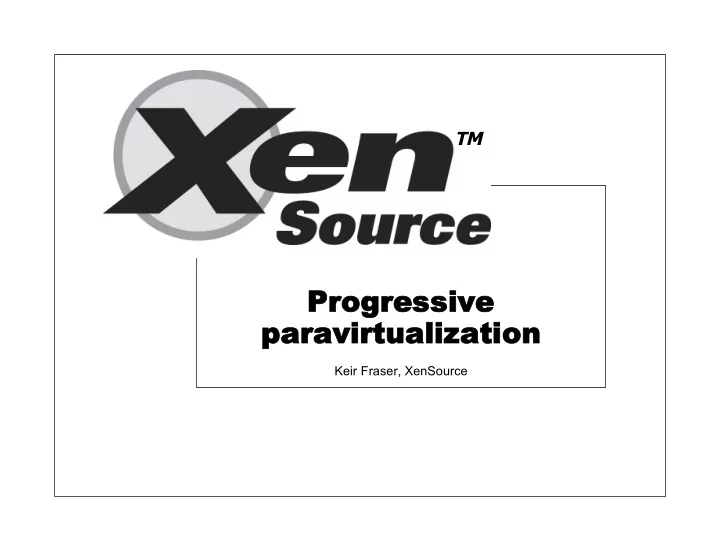

TM Progressive paravirtualization Keir Fraser, XenSource
HVM Architecture Domain 0 Domain N Guest VM (HVM) Guest VM (HVM) (32-bit) (64-bit) Linux xen64 (xm/xend) Control Models Device Unmodified OS Unmodified OS Panel 3D 3P Linux xen64 Front end Virtual Virtual driver Backend Drivers Guest BIOS Guest BIOS 0D Native Native 1/3P Device Device Virtual Platform Virtual Platform Drivers Drivers VMExit VMExit Callback / Hypercall PIC/APIC/IOAPIC Event channel emulation 0P Control Interface Scheduler Event Channel Hypercalls Processor Memory I/O: PIT, APIC, PIC, IOAPIC Xen Hypervisor
Progressive paravirtualization Hypercall API available to HVM guests Selectively add PV extensions to optimize Net and Block IO XenPIC (event channels) MMU operations • multicast TLB flush • PTE updates (faster than page fault) Time CPU and memory hotplug
PV Drivers Domain 0 Domain N Guest VM (HVM) Guest VM (HVM) (32-bit) (64-bit) Linux xen64 (xm/xend) Control Models Device Unmodified OS Unmodified OS Panel 3D 3P Linux xen64 FE Virtual FE Virtual Drivers Drivers Front end Virtual Virtual driver Backend Drivers Guest BIOS Guest BIOS 0D Native Native 1/3P Device Device Virtual Platform Virtual Platform Drivers Drivers VMExit VMExit Callback / Hypercall PIC/APIC/IOAPIC Event channel emulation 0P Control Interface Scheduler Event Channel Hypercalls Processor Memory I/O: PIT, APIC, PIC, IOAPIC Xen Hypervisor
Hypercalls HVM guest can detect hypervisor platform via CPUID instruction New hypervisor leaves at 0x40000000 Look for signature ‘XenVMMXenVMM’ Space for future expansion and feature flags Hypercall page is filled in by writing its address to a special MSR Location determined via CPUID Currently always MSR 0x40000000 Hypercall page hides low-level details of transferring control to the VMM
Building PV drivers for HVM PV drivers depend on architectural features of Xen Grant tables for memory sharing Event channels for asynchronous notifications Encapsulate support in a ‘platform driver’ Ioemu defines a dummy PCI device that triggers loading of the platform driver in the HVM guest Xenbus, blkfront, netfront can be built as separate modules against a native Linux build See unmodified_drivers/linux-2.6 in the xen-unstable tree
Xen support for PV-on-HVM Event-channel notifications cause an interrupt to be delivered via the virtual APIC on a pre-registered vector ‘Platform driver’ registers itself on that IRQ and demuxes pending events to registered drivers Future: IRQ per-device or per-VCPU Virtual CPUID and MSR addresses to allow hypervisor detection and hypercall setup Hypercalls are being incrementally extended to support HVM guests Also require support for 32-bit guests on 64-bit hypervisor: the 32-bit and 64-bit ABIs are different This work overlaps strongly with PAE-on-64 PV guest support
PV Driver performance 1000 900 rx tx 800 700 600 Mb/s 500 400 300 200 100 0 ioemu PV-on-HVM PV Measured with ttcp, 1500 byte MTU
Recommend
More recommend